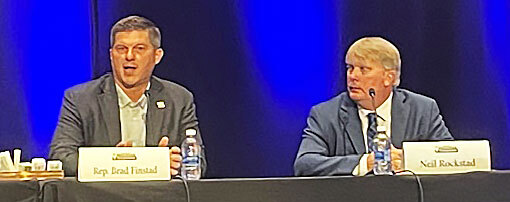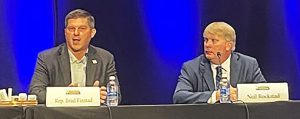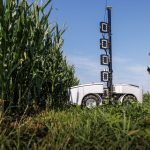Farm bill needs to address conservation title, FSA loans

FarmBill-RFP-081125
TRAVERSE CITY, Mich. — The farm bill needs to rewrite the conservation title and address Farm Service Agency guaranteed loans and loan limits, Rep. Brad Finstad, R-Minn., a member of the House Agriculture Committee, told the nation’s beet and cane growers who met here this week at the American Sugar Alliance’s International Sweetener Symposium.
Discussing what House Agriculture Committee Chairman Glenn “GT” Thompson, R-Pa., has described as a “skinny” farm bill to cover the programs not included in the budget reconciliation bill, Finstad said, “One, our conservation title needs to be rewritten. We need to make sure it makes common sense to you and I, as farmers. We don’t want to compete against the federal government for these insane CRP [Conservation Reserve Program] rates on ground that’s highly productive.”
“Maybe we should [shift] that money towards the most vulnerable, erodible land, and give that the highest rate, maybe our highest productive land should have a lower rate. These are common sense things that I do for my farmers all the time. We can do that in the next phase of the farm bill.”
Finstad added, “We also have to look at the FSA loans and the loan limits. What it takes to farm today is much different than when I started years ago. It’s going to be much different the next few years with all the pressures that we have. So, there’s a lot of work to do.”
In response to a question, he said, “My gut tells me it has to be done by the end of the year.”
Finstad said he believes the reconciliation bill dealt with the “controversy” in the farm bill and that most of the provisions in the farm bill will come from bipartisan bills.
(Despite what Finstad said, Thompson has said he wants to make changes to the nutrition title to allow people let out of prison and families with disabled children who exceed income limits on the Supplemental Nutrition Assistance Program to get benefits. Thompson has also said he expects controversies on proposals to overturn California’s Proposition 12, and on hemp and pesticide labeling.)
Finstad told the farmers, “I would encourage you all to stay on offense, get on offense, be proud of what you do. It’s the most honorable local profession, and we shouldn’t be afraid to talk about that to anybody and everybody that wants to hear it.”
In response to another question, Finstad also said commodity prices are so low there may have to be a discussion about an agricultural disaster bill.
“If I were selling my corn in October, it’s under $4, I”m just gonna hold on to it. Then you’re gonna have a whole different piece of problem when it comes to storage and all the other things that go along with that.
“So, we’re gonna have to have that conversation. And again, I look to all of you to help lead that, to help make sure you pound that drum, and make people know that this is a reality that we all are dealing with right now. We’re going to need some sort of short-term help to get us through this.”
Finstad, who chairs the House Agriculture Nutrition and Foreign Agriculture Subcommittee, said reauthorization of the 2018 farm bill had been stalled for three years over the nutrition title.
“We had a lot of folks that wanted to spend a lot more money and take a lot of the restrictions off, and a lot of the work requirements off, and really create more of a welfare state. And the [agriculture] component of the farm bill really got left to the side.”
He noted that the farm bill that Thompson released in 2024 scored at about $1.6 trillion over 10 years, with $1.2 trillion of it for nutrition and about $450 billion for farm programs. “It was a nutrition bill, not a farm bill,” he said.
“And, because of that, we were held hostage by folks on the other side of the aisle that did not want to bend, did not want to move when it came to trying to get our fiscal house in order. That really stalled that out. So, reconciliation, the one big, beautiful bill, was our opportunity to move a lot of the critical components that we have heard from all of you.”
Democrats, he noted, “did not want to adjust any of the eligibility for SNAP.”
On work requirements for SNAP, Finstad noted that the average age of a farmer is 58, but that the work requirement for able-bodied adults without children was 54. When the Republicans proposed raising that age eligibility to 65, the Democrats opposed it, even though “it’s 20 hours a week, which could involve a job, looking for a job, educating yourself to get a job, or volunteering at your church or something in your community.”
“The retirement age is typically 65 to 67. Why wouldn’t our government programs mirror that? And quite frankly, I think philosophically, why wouldn’t we want our neighbors to better themselves and have opportunities to work themselves off those programs? So that is one of the areas we were pushing, and the Democrats said, ‘absolutely not. We will not do a farm bill because of that.'”
Finstad said he doesn’t like the title of the One Big Beautiful Bill Act but likes the provisions.
“As a farmer, I’m a commonsense guy. I don’t get into hokey titles. You know, the One Big, Beautiful Bill. Typically, I’m a small government guy. I don’t think you can say One Big, Beautiful Bill. That, for me, sounds a little counterintuitive to what I think government should be. However, that is the reconciliation piece that we passed.”
Finstad said he was particularly pleased the bill raised the reference prices that trigger subsidy payments under the Agricultural Risk Coverage and Price Loss Coverage programs, raised the sugar program support prices, strengthened the crop insurance title and included tax provisions such as the estate tax and the research and development tax credit that help farms.
Finstad also said he was pleased that funding for the trade promotion programs was doubled. As a soybean farmer himself, Finstad said he is troubled that 60% of soybean exports go to China.
“We can no longer be content putting our head in the sand and saying we’re fine just putting our eggs in China’s basket. What if China wakes up tomorrow and says they don’t want our soybeans? What are we going to do?”
Finstad said what President Trump is accomplishing using the “economic lever of the tariff threat … is nothing short of remarkable.”
“In just six months, we have new trade deals that I don’t think any of us thought could happen in six months, new partners, new opportunities, new rates. This will create an opportunity for us to diversify our trade partners.”
Finstad said his service on the House Armed Services Committee has led him to be concerned about the fact that many animal vitamins are made in China.
“How do we bring some of that critical national security nature type-infrastructure back to our country? It’s high time we have that conversation from a national security perspective, from a food security perspective and just from a commonsense perspective.”
On immigration, Finstad he believes Trump’s policies make sense because even at the famed Mayo Clinic in Rochester, Minn., in his district, people are dying from fentanyl overdoses. But he acknowledged both agriculture and manufacturing need workers.
On the Make America Healthy Again movement promoted by Health and Human Services Secretary Robert F. Kennedy Jr., Finstad said, “We are as emotional as we have ever been as a country.”
“We’re doing a lot of things based on what we feel or what we think or what we heard based on our intellectual depth and capacity that we all have.
“And so the MAHA movement really is tapped into that emotionalness of our country. And so we’ve got to bring it back to facts and science and reality. And again, we’re in a position are we on offense and defense?
“I’ll just be blunt. We can’t say we’re for farmers, but yet emotionally regulate farmers off the farm based on junk science, half science, sound bites. So it’s up to us to push the MAHA report, push the movement to be educated.”
Pointing out that farmers are less than 2% of the entire population, Finstad said farmers need to educate the MAHA movement about precision agriculture, how they apply fertilizer and plant seeds.
“If we don’t, the horse might leave the barn in an emotional country. We might say, yeah, let’s get rid of sugar. Let’s get rid of that. Let’s do this. Let’s do that.”






